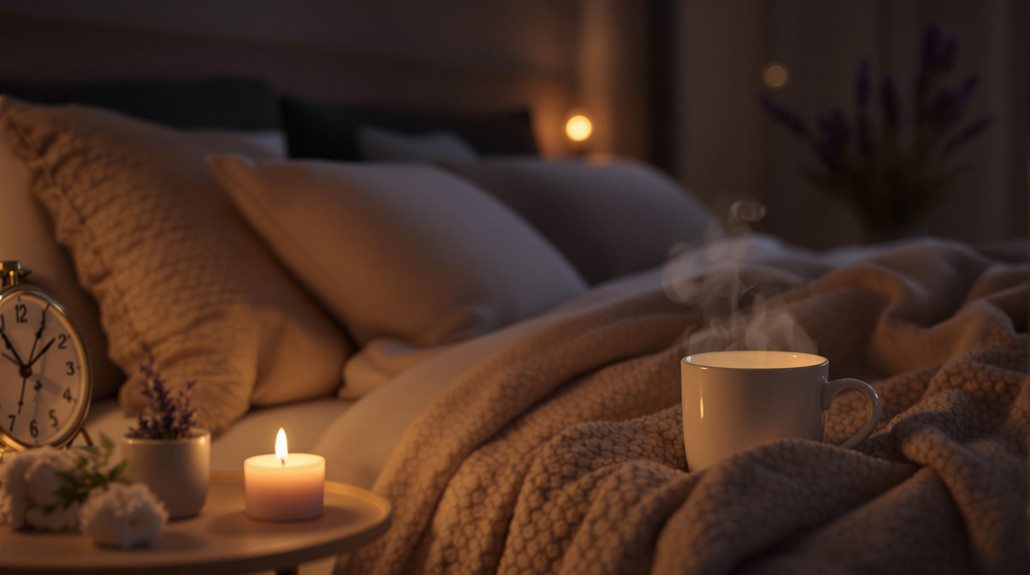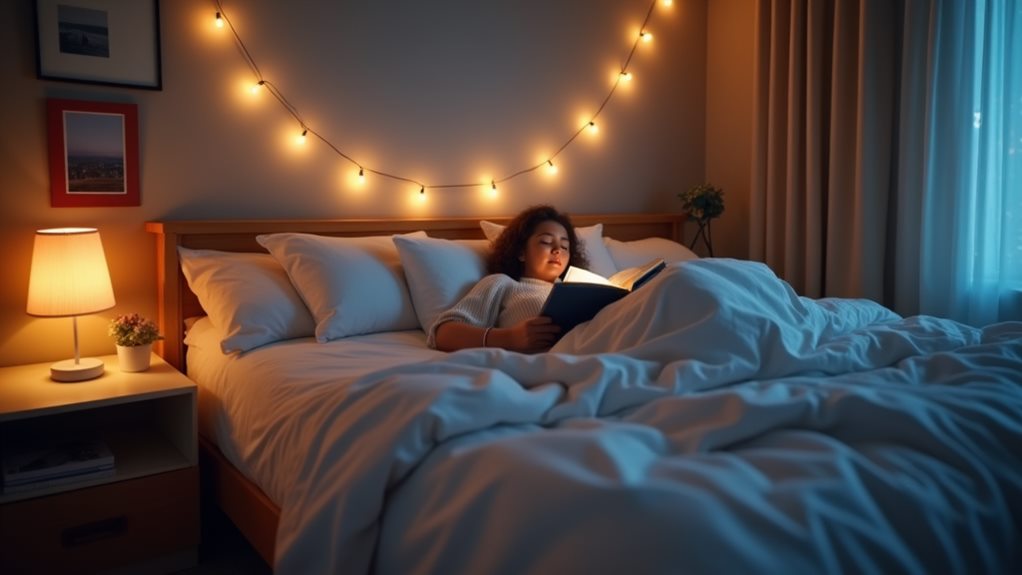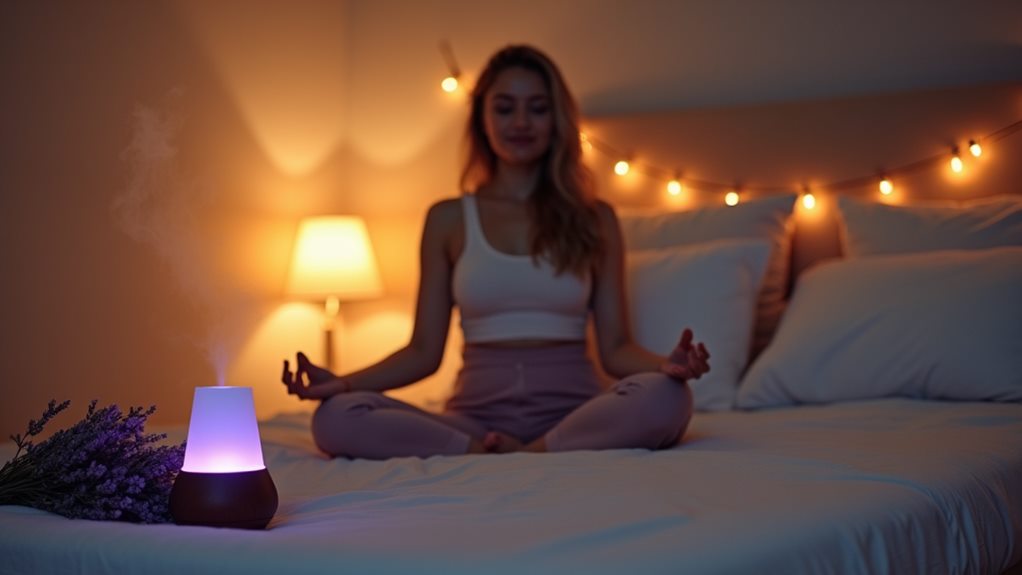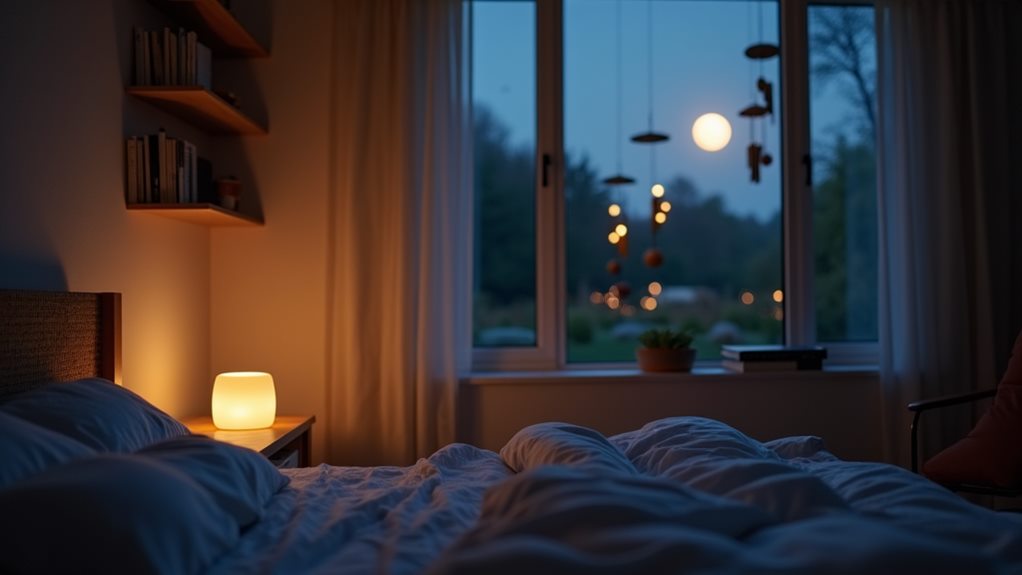
Imagine Sarah, who struggled with insomnia, found that establishing a consistent bedtime routine dramatically improved her sleep quality. You may wonder which specific habits can transform your nighttime experience. Could it be as straightforward as adjusting your screen time or adding a touch of mindfulness to your evening? Perhaps managing stress with simple techniques is key. As we explore these possibilities, consider how these practices might seamlessly fit into your life. How could small changes make a big difference in the way you rest each night? There’s more to discover about enhancing the quality of your sleep.
Stick to a Sleep Schedule

Creating a consistent sleep schedule is your ticket to better sleep. By aligning your bedtime and wake-up time with your circadian rhythm, you reinforce your internal clock and improve sleep quality. Natural light exposure during the day can further regulate this rhythm and enhance sleep. Aim for 7-9 hours of sleep each night to guarantee you’re well-rested and ready for the day. Sticking to a consistent bedtime minimizes daytime sleepiness and enhances your alertness during waking hours.
To embrace quality sleep, consistency is key—even on weekends. Breaking from your sleep schedule can confuse your internal clock, diminishing the restful sleep you achieved. To promote adherence, a sleep alarm can act as a mental cue, signaling when it’s time to prepare for bed. This makes maintaining your established schedule easier and more manageable.
If you find yourself tossing and turning for more than 20 minutes, get up and engage in a relaxing activity outside of your bedroom. This approach helps reset your mind and body for sleep.
Craft a Relaxing Environment
To achieve a soothing sleep sanctuary, focus on crafting a relaxing environment by maintaining an ideal bedroom temperature between 65 to 68 degrees Fahrenheit. This temperature range helps promote quality sleep by encouraging your body to cool down, which is a natural signal that it’s time to rest.
It’s also beneficial to guarantee quietness in your sleep environment; noise is a significant disruptor of sleep quality, and using white noise devices can help mask external sounds, aiding more restful sleep.
Besides temperature, a clutter-free bedroom enhances relaxation. Decluttering reduces stress and creates a calm environment where relaxation thrives.
Consider integrating aromatherapy into your bedtime routine. Scents like lavender essential oil can soothe your mind and help with a faster sleep onset, transforming your room into a more inviting space for rest.
As evening approaches, dim the lights to prepare for sleep. This signals to your body that it’s time to wind down, aiding in shifting your environment into a restful state.
Furthermore, creating a tech-free zone in the bedroom is essential. By removing electronics, you reduce distractions and minimize exposure to blue light, enhancing melatonin production and sleep readiness.
These adjustments in your bedroom environment can make a significant difference in achieving restful and quality sleep, leaving you refreshed and ready for the day ahead.
Limit Screen Time

Just as a relaxing environment sets the stage for a good night’s rest, it’s equally important to be mindful of screen habits before bedtime. Limiting screen time at least one hour before you sleep is essential. Blue light from devices can suppress melatonin production, making it harder to drift to sleep and disrupting your natural sleep-wake cycle. This often leads to sleep disturbances and reduced sleep quality. Creating a tech-free zone in your bedroom helps foster a calming environment vital for quality sleep.
To emphasize this point:
| Action | Effect |
|---|---|
| Limit screen time | Better melatonin production |
| Tech-free zone | Creates a calming environment |
| Evening screen use | Disrupts natural sleep-wake cycle |
| Reduce blue light | Improves sleep quality and duration |
If you must occasionally use screens, utilizing red-light filters on your devices can help minimize the impact of blue light. According to the American Academy of Sleep Medicine, reducing evening screen time significantly boosts sleep quality and health. Embrace the bedtime habit of stepping away from screens to enjoy more restful and rejuvenating sleep, enhancing your overall well-being.
Successful Pre-Sleep Activities
Engaging in calming pre-sleep activities is essential for a smooth change to sleep. Establishing an effective bedtime routine can help you fall asleep faster and improve your sleep quality.
By incorporating relaxation techniques into your evening regime, you signal to your body that it’s time to unwind and let go of the day’s stresses. Consider techniques such as deep breathing which require minimal time, allowing a quick shift into relaxation. Body scan meditation can also contribute to greater awareness of bodily sensations and promote overall relaxation.
Consider adding these activities to your nightly ritual:
- Sip herbal teas: Having a cup of chamomile or lavender tea can help soothe your mind and promote relaxation before bed.
- Mindfulness meditation: Spend a few moments in meditation or gentle stretches to reduce anxiety and calm the mind, which enhances your sleep quality.
- Journaling: Taking five minutes to jot down your thoughts or feelings can clarify your mind and reduce anxiety, making it easier to set aside worries and enjoy deeper rest.
- Light snacks: Opt for a small snack like yogurt or cherries. These can keep hunger at bay and feature sleep-promoting nutrients like melatonin.
Incorporate these strategies consistently into your bedtime routine, and you’ll likely find that you fall asleep faster and enjoy better-quality rest.
Manage Stress Effectively

When it’s time to wind down, managing stress effectively becomes essential for a restful night’s sleep. Engaging in mindfulness practices, like meditation, can greatly enhance sleep quality by lowering anxiety levels and promoting relaxation before bed.
Consider journaling for just five minutes each evening. This helps express and clarify thoughts, leading to mental calmness and making it easier to slip into sleep.
Implement stress management techniques in your pre-sleep routine. Deep breathing exercises are particularly useful, as they help release tension and create a peaceful atmosphere for drifting off.
Consistency in these practices is key to reinforcing good sleep hygiene.
Don’t forget to tackle tomorrow’s to-do list before bed. Set aside time to resolve concerns or organize tasks for the next day, reducing nighttime anxiety. This proactive approach means a smoother shift when your head hits the pillow.
Establishing a pre-sleep routine focused on relaxation and mental calmness can greatly improve your nightly rest. By regularly practicing these techniques, you’ll find stress levels drop, leading to better sleep quality and revitalized mornings.
Mindful Evening Practice
Incorporating mindful practices in the evening can transform your bedtime routine and improve sleep quality.
Engage in just 10 minutes of meditation to calm your mind, or try journaling to clear mental clutter and lay your thoughts to rest.
Techniques like deep breathing and gentle stretches help relax your body, while reducing screen time and blue light sharpens this shift, setting the stage for restful sleep.
Evening Relaxation Techniques
Fostering mindfulness through evening relaxation techniques can be a transformative part of your bedtime routine. By integrating mindfulness meditation into your evening, you can greatly boost your sleep quality. Spend at least 10 minutes on this practice to encourage mental calmness and reduce pre-sleep anxiety.
Incorporating gentle stretches or yoga can also enhance relaxation, preparing both your body and mind for rest. You might also consider adding deep breathing exercises, which activate your body’s relaxation response, helping you achieve a tranquil state that’s essential for sleep readiness. Just a few minutes of slow, deep breaths can lower your heart rate and usher in a peaceful mindset.
Engaging in non-stimulating activities during the hour before bed, such as reading a calming book, can signal to your body that it’s time to wind down. These activities ultimately reduce stress and build a tranquil atmosphere conducive to sleep.
Here’s a quick recap of how to incorporate evening relaxation techniques:
- Mindfulness meditation: Spend 10 minutes to calm your mind.
- Gentle stretches: Incorporate before bed to relax your body.
- Deep breathing exercises: Practice to activate relaxation.
- Non-stimulating activities: Engage in before bed for winding down.
Journaling for Mental Clarity
After engaging in evening relaxation techniques, you might find it beneficial to pick up a journal for a few minutes. This mindful practice allows you to gain mental clarity by expressing and processing your thoughts and feelings. Journaling can become a key part of your pre-sleep routine, helping to calm your mind and reduce anxiety. Just five minutes of reflective writing before bed can make it easier to shift into a restorative sleep, enhancing overall sleep quality.
When you take the time to jot down a to-do list, you’ll stop worrying about forgetting important tasks. This simple act can lift a weight off your mind, creating space for relaxation.
Opt for analog journaling, as it minimizes distractions and encourages a more focused writing experience. This approach promotes deeper introspection and guarantees that journaling serves as a calming ritual, rather than a time to engage with screens.
Incorporating journaling into your nightly routine signals to your brain that it’s time to unwind, reinforcing effective sleep hygiene. By making journaling a mindful part of your evening, you’ll support your journey towards better, more restful sleep.
Meditation’s Sleep Benefits
Many find that incorporating mindfulness meditation into their evening routine offers considerable sleep benefits. By reducing anxiety and promoting a calm mental state, meditation helps create a conducive environment for quality sleep. Regular practice can improve sleep quality, allowing you to fall asleep faster and enjoy a more restful night.
Engaging in mindful evening practices, such as breath awareness or guided imagery, helps you recognize and release racing thoughts, a common hurdle at bedtime.
You might consider these meditation techniques as part of your nighttime routine:
- Progressive muscle relaxation: Focus on tensing and then relaxing each muscle group to enhance physical relaxation, helping your body shift to sleep mode more effortlessly.
- Breath awareness: Concentrate on your breathing pattern, allowing distractions and stress to fade away, making it easier to fall asleep.
- Guided imagery: Visualize calming scenes to distract your mind from daily worries and reduce anxiety.
- Mindful listening: Tune into soothing music or nature sounds to quieten your mental chatter and prepare for sleep onset.
Incorporating just 10-20 minutes of meditation into your bedtime habits can greatly improve sleep quality, ensuring you wake up feeling refreshed and ready for the day.
Sleep-Enhancing Sounds

Incorporating calming music or ambient noise into your bedtime routine can greatly enhance relaxation and improve sleep quality.
Sounds like pink noise, such as rain or ocean waves, help mask disruptive noises, while white noise machines or apps provide consistent auditory stimulation to promote a restful atmosphere.
You can easily access these soothing soundscapes through streaming platforms, offering curated playlists to create your perfect pre-sleep environment.
Benefits of Calming Music
Listening to calming music before bedtime offers several benefits that can greatly enhance your sleep quality. It reduces anxiety and promotes relaxation, setting the stage for a restful night.
Calming music can help lower your heart rate and improve your mental state, making it easier to drift into sleep. Curated playlists featuring soothing sounds, like light piano or mellow jazz, are ideal for a pre-sleep routine. These playlists create a serene environment, paving the way for a smooth shift to sleep.
Music with a tempo of 60-80 beats per minute is particularly effective, as studies indicate it promotes better sleep outcomes. When your heart rate aligns with this tempo, you’re likely to experience deeper sleep cycles.
Including calming music as part of your pre-sleep routine can help anchor your evening rituals around relaxation, leading to consistent, quality rest.
Consider adding these elements to your bedtime routine:
- Curated playlists featuring piano melodies
- Soothing sounds like rain or ocean waves
- Music at 60-80 beats per minute to slow heart rates
- Consistent pre-sleep routine with relaxation-focused activities
Impact of Ambient Noise
Although often overlooked, ambient noise can play an essential role in enhancing sleep quality. By masking disruptive noises and establishing a consistent soundscape, ambient noise like white or pink noise encourages relaxation. Pink noise, with its lower frequencies reminiscent of gentle rain, has been linked to longer sleep and deeper rest, creating an inviting sleep environment.
You’re probably familiar with how calming music can ease your mind before bed. It helps lower anxiety and shifts your thoughts away from worries, making it easier to drift into sleep. You can easily find curated playlists or relaxing soundscapes on streaming platforms, tailored to improve your sleep setting. It’s a simple way to enhance your sleep-friendly atmosphere without much effort.
In urban environments, external sounds can be quite a nuisance. Using ambient noise machines or apps can greatly aid in masking these disturbances with soothing sounds.
Whether you opt for the steady hum of white noise, the natural rhythms of pink noise, or even calming music, these noise-masking tools are essential. They cultivate an ideal sleep environment, directly contributing to improved sleep quality.
Consider experimenting with different sounds to find what best complements your bedtime routine.
White and Pink Noise
White and pink noise can transform your sleep routine by creating a more stable and serene auditory environment.
White noise produces a steady, unvarying sound that effectively masks other disruptive noises, making it easier for you to fall asleep and stay asleep. If you’re battling with noisy neighbors or street sounds, incorporating white noise into your bedtime routines can be essential for improved sleep quality.
On the other hand, pink noise, with a more balanced sound spectrum, offers benefits like promoting deeper sleep. Research shows that experiencing pink noise during your sleep can enhance slow-wave sleep, vital for physical recovery and memory consolidation.
Ambient sounds like gentle ocean waves or soft wind can also foster a calm atmosphere perfect for relaxation. Such soothing sounds prepare your mind for deep sleep by creating a comforting auditory environment.
You can access curated playlists with sleep-enhancing sounds on various streaming platforms to support your bedtime routines effectively.
Here’s how you can benefit:
- Mask disruptive noises with white noise for peace.
- Enhance slow-wave sleep using pink noise.
- Create a calming atmosphere with ambient sounds.
- Plan your bedtime routine using tailored auditory environments.














